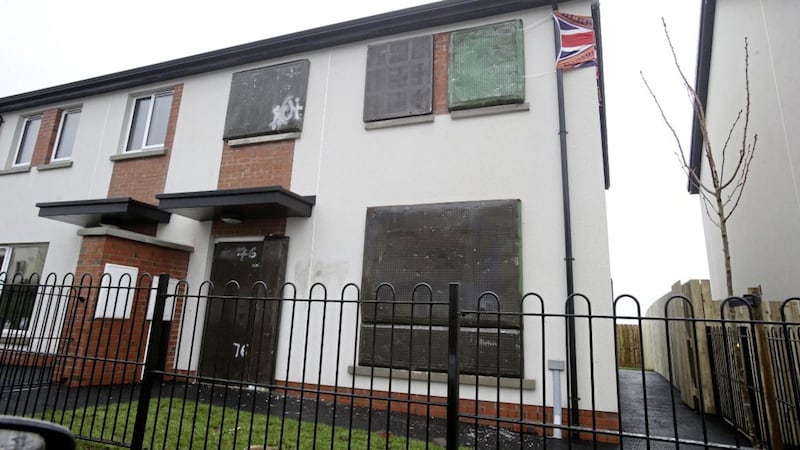CATHOLIC families targeted in a spate of sectarian attacks on homes in north Belfast have not been awarded intimidation points on the housing waiting list.
Attacks were carried out shortly before Christmas on three new-build social houses allocated to Catholics in Tyndale Gardens in the mainly unionist Ballysillan area.
Windows were smashed, flags were draped from drainpipes and on one property 'KAT' (kill all taigs) was scrawled on a wall.
Police are continuing to investigate the attacks as sectarian hate crimes and have not ruled out loyalist paramilitary involvement.
However, it has since emerged that two of those targeted have been refused intimidation points.
A young Catholic mother from west Belfast was preparing to move into one of the properties with her four young boys, two of whom have special learning needs.
The 25-year-old has been told intimidation points were not awarded because she had not yet moved in when the attacks occurred.

SDLP west Belfast activist Paul Doherty, who has been assisting the young mother, expressed surprise at the decision.
"The keys were signed over to her. What this suggests is that this intimidation wasn't aligned to her and her moving into this house, which is ridiculous," he said.
"It is a very strange decision but one that we are certainly appealing."
Mr Doherty said the young mother has continued to be targeted with online abuse since the attack on the Choice Housing properties.
"This girl is still suffering as a result of this intimidation, whereas she should have been living in this home prior to Christmas with her children."
Applicants for social housing are awarded points based on their circumstances to help prioritise who should be offered a home.
Intimidation points can be given to those who have been attacked or threatened, or if their home has been targeted where there is a "serious and imminent risk" of death or serious injury.
A second woman who was moving into one of the homes with her daughter has also been denied intimidation points, SDLP councillor Paul McCusker has said.
He has been helping in her case and is due to meet with housing authorities.
He said the woman had moved into the property and "felt unsafe" when it was vandalised.
"There are strict criteria but for me I feel this lady did meet the criteria. It was quite aggressive in terms of the threat and possibly there were paramilitaries behind this," he said.
The Housing Executive, which assesses entitlement to intimidation points, said it carefully considers the individual circumstances of each case.
In relation to the woman being assisted by Mr Doherty, it said: "In this case, intimidation points were not awarded as the tenancy had not commenced and the applicant was not living at this address.
"Through this process, the applicant has been living at their continuing address.
"They continue to be recognised as a Full Duty Applicant with a high level of housing points. We have been in regular contact with the applicant and will continue to seek a suitable housing solution for them."
The decision to award intimidation points under the Housing Selection Scheme has a "higher threshold of evidence and information than when awarding Full Duty Applicant status (statutory homelessness)".
It added: "We carefully consider the individual circumstances of each case, taking relevant information into account and we use our discretion to decide whether there is serious and imminent risk that the applicant, or a member of their household, would be killed or seriously injured if they were to live or to resume living in their home."








